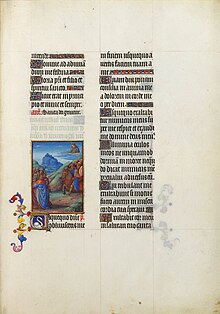

| Psalm 13 | |
|---|---|
| "How long, O Lord" | |

Psalm 13 in the
Très Riches Heures du Duc de Berry | |
| Other name |
|
| Language | Hebrew (original) |
Psalm 13 is the 13th psalm of the Book of Psalms, beginning in English in the King James Version (KJV): "How long, O Lord". The Book of Psalms is part of the third section of the Hebrew Bible,[1] and a book of the Christian Old Testament. In the Greek Septuagint and the Latin Vulgate, this psalm is Psalm 12 in a slightly different numbering system. In Latin, it is known as "Usquequo Domine".[2]
The psalm forms a regular part of Jewish, Catholic, Lutheran, Anglican and other Protestant liturgies.
Theodoret theorized that this psalm was composed by David when his son Absalom conspired against him.[3] However, Charles Spurgeon asserts that any attempt to link it to a specific incident is conjecture; rather, the psalm gives voice to feelings that arise in any of the many trials that a person undergoes in life.[4]
Jewish and Christian commentators note the three-part structure of this psalm, with verses 2–3 in the Hebrew (1-2 in the KJV) relating to David's complaint, verses 4–5 in the Hebrew (3–4 in the KJV) expressing David's prayer, and verse 6 in the Hebrew (5-6 in the KJV) describing David's salvation.[5] A. G. Brown asserts that prayer is the turning point between mourning and rejoicing.[4]
Spurgeon notes that the repetition of the words "How long?" four times in this psalm resemble cries; he creatively refers to this psalm as the "How Long Psalm" or the "Howling Psalm".[4]
The following table shows the Hebrew text[6][7] of the Psalm with vowels alongside an English translation based upon the JPS 1917 translation (now in the public domain).
| Verse | Hebrew | English translation (JPS 1917) |
|---|---|---|
| 1 | לַמְנַצֵּ֗חַ מִזְמ֥וֹר לְדָוִֽד׃ | For the Leader. A Psalm of David. |
| 2 | עַד־אָ֣נָה יְ֭הֹוָה תִּשְׁכָּחֵ֣נִי נֶ֑צַח עַד־אָ֓נָה ׀ תַּסְתִּ֖יר אֶת־פָּנֶ֣יךָ מִמֶּֽנִּי׃ | How long, O LORD, wilt Thou forget me for ever? How long wilt Thou hide Thy face from me? |
| 3 | עַד־אָ֨נָה אָשִׁ֪ית עֵצ֡וֹת בְּנַפְשִׁ֗י יָג֣וֹן בִּלְבָבִ֣י יוֹמָ֑ם עַד־אָ֓נָה ׀ יָר֖וּם אֹיְבִ֣י עָלָֽי׃ | How long shall I take counsel in my soul, having sorrow in my heart by day? How long shall mine enemy be exalted over me? |
| 4 | הַבִּ֣יטָֽה עֲ֭נֵנִי יְהֹוָ֣ה אֱלֹהָ֑י הָאִ֥ירָה עֵ֝ינַ֗י פֶּן־אִישַׁ֥ן הַמָּֽוֶת׃ | Behold Thou, and answer me, O LORD my God; Lighten mine eyes, lest I sleep the sleep of death; |
| 5 | פֶּן־יֹאמַ֣ר אֹיְבִ֣י יְכׇלְתִּ֑יו צָרַ֥י יָ֝גִ֗ילוּ כִּ֣י אֶמּֽוֹט׃ | Lest mine enemy say: 'I have prevailed against him'; Lest mine adversaries rejoice when I am moved. |
| 6 | וַאֲנִ֤י ׀ בְּחַסְדְּךָ֣ בָטַחְתִּי֮ יָ֤גֵ֥ל לִבִּ֗י בִּֽישׁוּעָ֫תֶ֥ךָ אָשִׁ֥ירָה לַֽיהֹוָ֑ה כִּ֖י גָמַ֣ל עָלָֽי׃ | But as for me, in Thy mercy do I trust; My heart shall rejoice in Thy salvation. I will sing unto the LORD, Because He hath dealt bountifully with me. |
Verse 6 in the Hebrew is recited in the morning prayer service during Pesukei dezimra.[8]
According to the Chasam Sofer and the Siddur Sfas Emes, the entire psalm is recited as a prayer for the well-being of a sick person.[8]
Around 530, St. Benedict of Nursia chose this psalm to be recited for the office of prime on Thursday in the Rule of St. Benedict. In the modern Liturgy of the Hours, Psalm 13 is recited or sung to the Office for Midday Prayer on the Tuesday of the first week of the four-weekly cycle.
In the Church of England's Book of Common Prayer, Psalm 13 is appointed to be read on the evening of the second day of the month.[9]
Heinrich Schütz wrote a setting of a paraphrase of Psalm 13 in German, "Ach Herr, wie lang willst du denn noch", SWV 109, for the Becker Psalter, published first in 1628. In 1692, Michel-Richard de Lalande wrote his great Latin motet (S. 40) for the offices of the Royal Chapel of Versailles. His contemporary Henry Desmarest also composed a grand motet on this psalm. Marc-Antoine Charpentier set around 1685 one "Usquequo Domine" H.196, for 4 voices, recorder, flutes, and continuo. In German, the psalm was set to music by Johannes Brahms for women's choir in three voices, "Herr, wie lange willst du".[10] Friedrich Kiel set verses as No. 6 of his Six Motets, Op. 82, published in 1883. Franz Liszt scored it for a tenor soloist as the psalmist, mixed choir, and orchestra.
The Canadian Christian singer-songwriter and worship leader Brian Doerksen wrote with others a song called 'How long, O Lord'.[11]
{{cite book}}: |work= ignored (help)